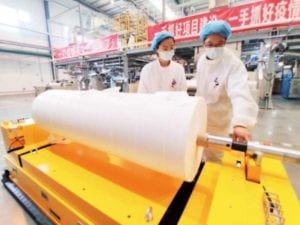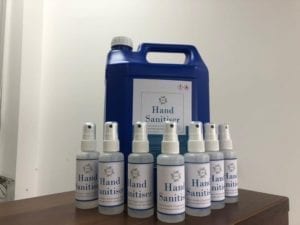Many chemical processing and engineering companies are contributing to efforts to fight the spread of COVID-19:
PKN Orlen (Płock, Poland) has provided the Vatican and the Office of Papal Charities with protective products to help combat the COVID-19 pandemic. The protective products will be distributed to Vatican Gendarmerie units, which helped organize the World Youth Day in Poland, to the Swiss Guard, who are responsible for Pope Francis’s personal security and, first and foremost, to the needy, including the homeless, migrants, and residents of nursing homes. The aid donated by PKN ORLEN included 705,000 disposable masks, 30,000 masks made by Poland-based company Brubeck, 3,600 5-L containers of hand sanitizer liquid, 3,200 5-L containers of surface disinfectant, and 10,000 protective coveralls. Personal protective equipment was also sent by PKN ORLEN to Lithuania, to be provided to the Lithuanian government and to institutions which need it most.
Sinopec (Beijing, China) subsidiary Sinopec Yizheng Chemical Fiber Co Ltd. put its 12th meltblown non-woven fabric production lines into operation on May 9. Sinopec has now completed the construction of all its 16 meltblown non-woven fabric production lines to make materials for masks. After the full operation of the 16 production lines and together with Sinopec’s joint venture enterprises that can produce seven metric tons of meltblown non-woven fabric every day, the daily production capacity of the company is expected to reach 37 metric tons, and its annual production capacity will exceed 13,500 metric tons, enough to make 13.5 billion medical face masks. According to Sinopec, it took only 76 days to construct the world’s largest meltblown non-woven fabric production base from the commencement on February 24 to full operation on May 9.

Sinopec puts its 16th meltblown non-woven fabric lines into production (Source: Sinopec)
Arkema Inc. (Colombes, France) contributed hand sanitizer solution to the New York State Office of Emergency Management, Pennsylvania Emergency Management Agency, Texas Division of Emergency Management and Tennessee Emergency Management Agency. It is meant for distribution to health organizations in areas that have been hard hit by COVID-19. Arkema has repurposed a production line at its plant in Geneseo, N.Y. to manufacture 38,000 liters of hand sanitizer solution. This solution has been donated to New York, Pennsylvania, Tennessee and Texas, where the company has a key presence.

Corrosion-inhibitor manufacturer Hexigone has shifted its production capabilities to also make hand sanitizer for pandemic response needs (Source: Hexigone)
Hexigone Inhibitors Ltd. (Port Talbot, U.K.), a manufacturer of corrosion inhibitors, has begun manufacturing hand sanitizer to help protect staff on the pandemic front line. The sanitizer, which meets the standard set by the World Health Organization, is already in use in local organizations. The U.K. Government’s innovation agency, Innovate UK, linked-up Hexigone with pharmaceutical giant Glaxosmithkline, who subsequently donated 8,000 L of isopropanol to ramp-up production. The project started via the South Wales Additive and Rapid Manufacturing (SWARM) Consortia as a joint venture with Swansea University. And after some joint-learning when setting up the manufacturing process, the teams divided their efforts to increase output to the front line.
Merck KGaA (Darmstadt, Germany) says that it has provided 800,000 surgical face masks in the U.S. for use as part of urgent efforts to address the outbreak in New York and New Jersey. Merck typically uses these types of masks, and others, in many aspects of its manufacturing and research work. The company continues to look closely at available supplies of personal protective equipment and other supplies for potential use by health care workers, and plans to partner with health authorities to allocate those supplies to areas of need.